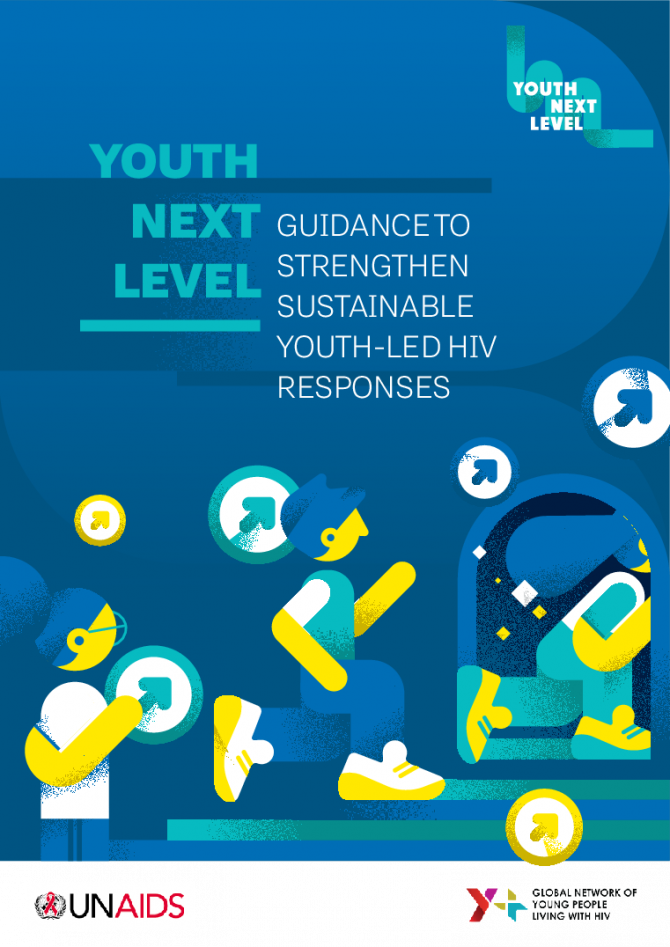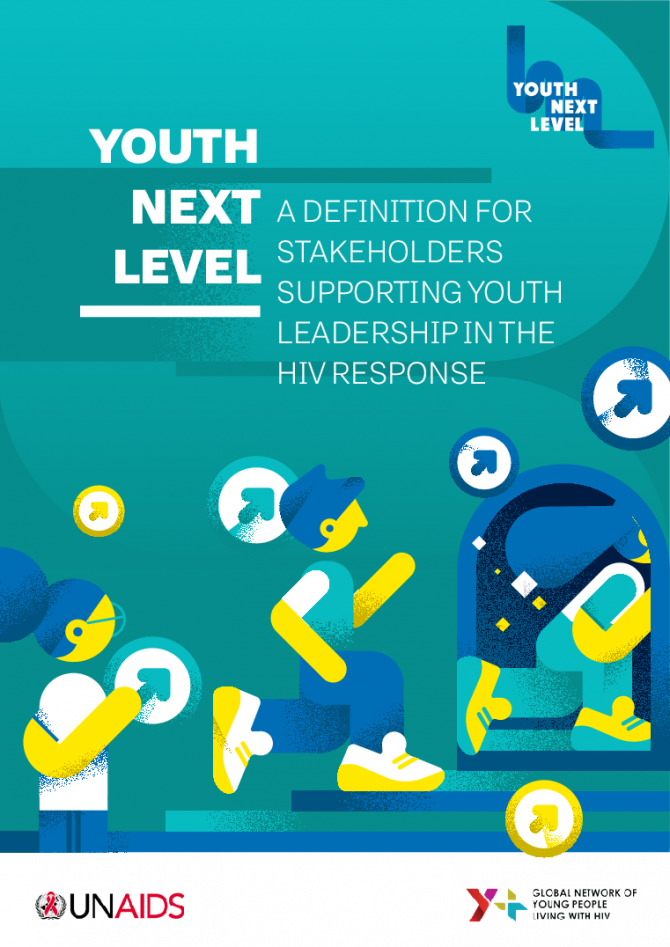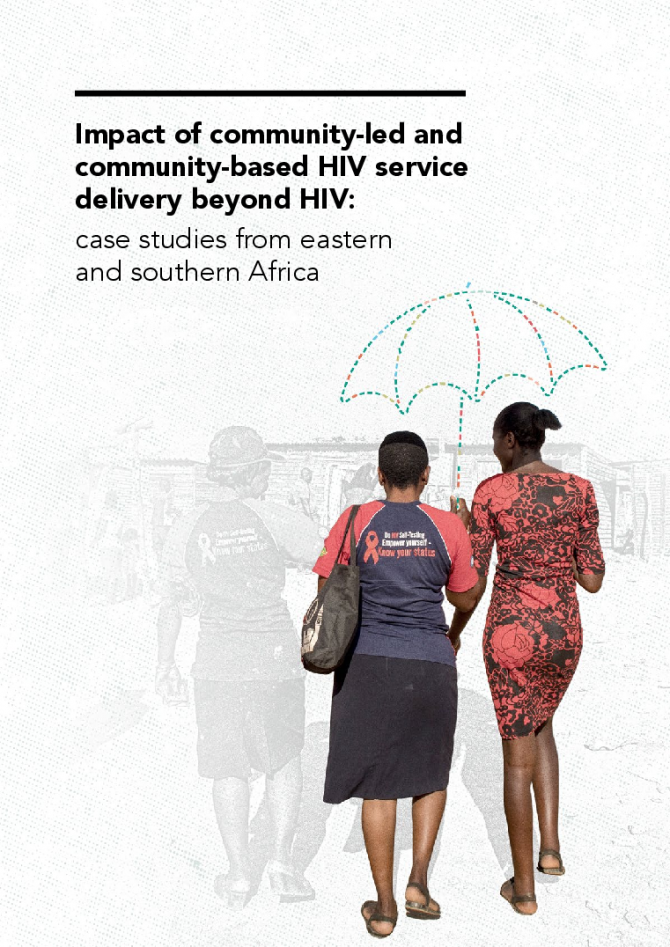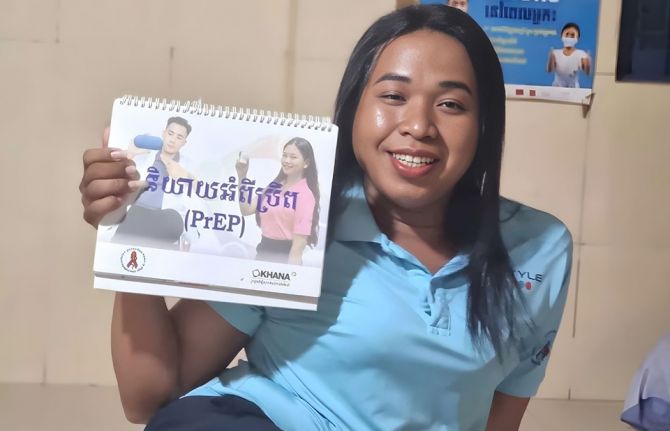
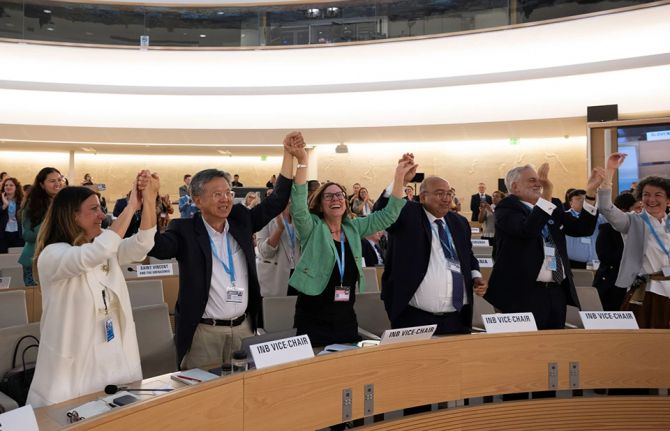
Press Release
UNAIDS welcomes WHO Pandemic Agreement
20 May 2025 20 May 2025Governments at the 78th annual World Health Assembly have adopted a global Pandemic Agreement. The Joint United Nations Programme on HIV/AIDS (UNAIDS) and other stakeholders played an important role in supporting the process by advocating for an agreement that centres equity and human rights.
Responding to the news, Winnie Byanyima, Executive Director of UNAIDS, said:
“Amid the devastating crisis in global health funding, this truly global agreement offers a ray of hope. It is an affirmation that multilateralism remains possible, and indeed the only way to fight the viruses that exploit global divisions but refuse to respect borders.
I congratulate South Africa and France as Co-Chairs; Australia, Brazil, Egypt and Thailand as Vice-Chairs—each representing their region—and WHO Director-General Dr Tedros for this landmark achievement.
The text is a commitment that global equitable access will be a guiding principle in pandemic preparedness, prevention and response. Crucially, governments will attach conditions to public funding—which means that, when a pharmaceutical company takes public money, it should come with clear conditions requiring equitable access. And it makes technology transfer a priority.
While the Agreement is a product of compromise—and governments should treat it as a floor, not a ceiling—still, it gives humanity some of the tools needed to ensure the next pandemic does not repeat the horrific inequity of HIV and COVID-19. It is our chance to break the pandemic-inequality cycle—and governments should be bold and swift in their implementation.”
Ms Byanyima will discuss the implications of the Pandemic Agreement on the sidelines of the World Health Assembly at an event organized by the Global Council on Inequality, AIDS and Pandemics on Wednesday 21 May, 08:30 – 10:00 CET. Find out more about UNAIDS’s engagements at #WHA78 here.
UNAIDS
The Joint United Nations Programme on HIV/AIDS (UNAIDS) leads and inspires the world to achieve its shared vision of zero new HIV infections, zero discrimination and zero AIDS-related deaths. UNAIDS unites the efforts of 11 UN organizations—UNHCR, UNICEF, WFP, UNDP, UNFPA, UNODC, UN Women, ILO, UNESCO, WHO and the World Bank—and works closely with global and national partners towards ending the AIDS epidemic by 2030 as part of the Sustainable Development Goals. Learn more at unaids.org and connect with us on Facebook, Twitter, Instagram and YouTube.
Related resources


Feature Story
How the shift in US funding is threatening both the lives of people affected by HIV and the community groups supporting them
18 February 2025
18 February 2025 18 February 2025On 20 January 2025 the United States announced a 90-day freeze on US foreign aid which has had a devastating impact on people living with and affected by HIV, on the people and organizations supporting them and on the global response to HIV as a whole.
Community organizations have been particularly impacted by the freeze in funding. Community healthcare workers are losing their jobs, clinics are having to be shut down and, as a result, people in need of HIV testing or prevention or who are living with HIV and dependent on daily antiretroviral medicine are unable to access the life-saving HIV services they need.
On 10 February, UNAIDS convened an emergency meeting with community organizations to monitor the impact of the unfolding crisis. Community groups reported that HIV services around the world are facing serious challenges. Some are grinding to a halt. Supplies of antiretroviral medication, pre-exposure prophylaxis (PrEP), post-exposure prophylaxis (PEP) and condoms have been disrupted, leaving many without essential tools of HIV treatment and prevention.
HIV testing kits are increasingly scarce and outreach services – essential for connecting people in need of HIV testing – are being suspended. As a result, HIV and sexually transmitted infection testing are disrupted, threatening detection and prevention efforts.
“The damage is immediate and severe,” said one advocate. “People who rely on [U.S.-funded] programmes for [safety and] survival are suddenly left with nothing.”
The US pause in administering foreign assistance while it reviews recipients is not just a bureaucratic delay; it is a direct threat to continued progress against AIDS and will quickly erode decades of hard-won gains in the global HIV response. It will destroy many community organizations without which the world cannot close the gaps in HIV testing, prevention and treatment.
The US Government has invested more than US$ 100 billion to date in the global fight against AIDS with the US accounting for around 73% of donor funding for HIV worldwide; millions of people at risk for and living with HIV rely on US funded clinics to stay healthy in the face of HIV.
Community-led data reveals community organizations are bearing the brunt of the pause
A survey conducted by the Uganda Key Populations Consortium found that 97% of respondents reported negative effects on their HIV service due to the freeze on US foreign assistance. A staggering 43% of organizations supporting key populations surveyed said they relied on US funding for at least 76% of their budgets.
Another joint survey by Aidsfonds, the Global Network of People Living with HIV (GNP+), and the Robert Carr Fund found similarly worrying results. Of 564 organizations surveyed across 25 countries, 95% reported direct impacts from the US funding freeze. 43% of programmes have paused implementation, while 35% have fully suspended operations.
“The results are alarming,” said Mark Vermeulen, Director of Aidsfonds. “More than half (57%) of the organizations estimate that this crisis will impact more than a million people. The longer these disruptions persist, the greater the risk of a new generation of preventable HIV infections. This threatens to undo the hard-earned progress in reducing new infections among children.” (New HIV infections among children had been reduced by 62% from 2010 to 2023, largely thanks to investment and commitment from the US Government).
It’s not just people living with or at risk for HIV that face an existential threat
The financial void left by the US aid freeze of its foreign assistance is forcing community groups to fire employees and/or to close up shop entirely. Many community organizations do not have sufficient funding reserves to stay afloat through the 90-day (or perhaps longer) period of no US funding.
“The leadership of national networks of people living with HIV have been forced to let go of community cadre staff- peer educators, adherence counselors, community health facilitators, and mentor mothers,” said Florence Anam, Co-executive Director of GNP+.
GNP+ recently convened with leaders from national and regional networks of people living with HIV and released a statement with the main concerns.
“These organizations are not a luxury – they are critical for ending AIDS,” said Christine Stegling, Deputy Executive Director, UNAIDS. “Serving as advocates, peer educators, care providers and watchdogs, community-led organizations ensure that lifesaving HIV testing, prevention and treatment reaches those most in need.”
Many organizations have spent years garnering the trust of the communities they serve. If these organizations disappear, even if others replace them one day, it will take years to reestablish the bonds of trust that allow them to be so instrumental in encouraging people to seek HIV care.
In a joint survey by Aidsfonds, GNP+ and the Robert Carr Fund 22% of organizations reported increased experiences of discrimination, including reports of discrimination within healthcare settings, where people faced barriers to accessing care.
LGBTQ+ communities in need of HIV testing, prevention and treatment fear increased risks of violence and discrimination as funding for protective services – led by HIV community groups – disappear.
Since the earliest days of the AIDS pandemic, communities and community-led services have been instrumental in ensuring equitable, accessible HIV testing, prevention and treatment – as well as the supportive services that make all three possible.
Communities have been at the forefront, driving the delivery of comprehensive care, life-saving treatment and offering regular monitoring and prevention services and psychosocial support. Their unwavering dedication has not only saved millions of lives but also reshaped the trajectory of the AIDS pandemic. Their leadership and work on HIV are a model for all other responses to communicable diseases.
By paralyzing frontline response efforts led by community groups, the US decision to freeze funding is weakening health systems across the Global South. The freeze not only jeopardizes precious gains made to date against HIV – it also threatens to usher in a new wave of entirely preventable HIV infections and AIDS-related deaths.
The community groups stressed that this crisis extends beyond HIV treatment. The funding cuts impact efforts to provide clean water, basic education and to prevent human trafficking of girls. The loss of funding is dismantling the fragile safety net that has been built over decades around the world
“We are deeply concerned about the sustainability of the HIV response, particularly support for key populations, HIV prevention, human rights and community led responses. We are re-orienting our own efforts to support the communities and organizations that are both bearing the brunt of the loss of funding and facing targeted attacks on their rights and their very lives,” said John Plastow, Executive Director of Frontline AIDS, a global partnership, headquartered in the UK and South Africa, that works with 60 partners across 100 countries around the world. Over 20 of their partners have said they are affected by the US foreign aid freeze.
Since the US funding freeze on foreign assistance was announced, UNAIDS has conducted daily assessments led by its regional and country teams to track disruptions and to relay urgent needs to donors and to governments of affected countries. At country and regional levels, UNAIDS has also been convening people living with HIV and other affected communities to assess the impact and discuss mitigation measures. For the latest updates: Impact of recent U.S. shifts on the global HIV response - The global impact of PEPFAR to date | UNAIDS
UNAIDS stands in solidarity with community leaders calling on the US, other donors and governments of affected countries to step in before irreversible damage is done. UNAIDS and communities call on the US to maintain its global leadership on, and unparalleled support for the global response to AIDS. Without immediate intervention, decades of progress in the global HIV response will be undone, leaving the world on the precipice of a public health disaster that we have the power and tools to avert.
Related
Documents
Youth Next Level: guidance to strengthen sustainable youth-led HIV responses
19 July 2024
Youth Next Level is a suite of resources that provides concrete guidance and recommendations on how to effectively support the scale-up of youth-led HIV responses and accelerate the achievement of Result Area 7 of the Global AIDS Strategy and the 30-80-60 community leadership targets of the 2021 Political Declaration on HIV/AIDS. See also: Steps for country rollout | Definitions
Documents
Youth-led responses: a definition for stakeholders supporting youth leadership in the HIV response
19 July 2024
A participatory process was convened that engaged over 100 young people in all regions to support the development of the definition. A survey, along with consultations in English, Russian and Spanish, ensured young people in all their diversity had the opportunity to feed into the process and have their say on what youth-led responses are. It was also identified in the process that for a definition of “youth-led responses” to be effective, there would need to be a definition of “youth-led organizations”, which was developed concurrently. See also: Youth Next Level: main guidance | Steps for country rollout
Documents
Impact of community-led and community-based HIV service delivery beyond HIV: case studies from eastern and southern Africa
30 January 2025
Communities of people living with or affected by HIV have been at the forefront of delivering HIV-related services since the start of the HIV pandemic. This report shows that because community-led HIV service delivery is people centred it addresses the holistic needs of the person and therefore has an impact beyond HIV. Community responses to HIV can contribute significantly to achieving universal health coverage, social protection, economic empowerment, and other benefits.


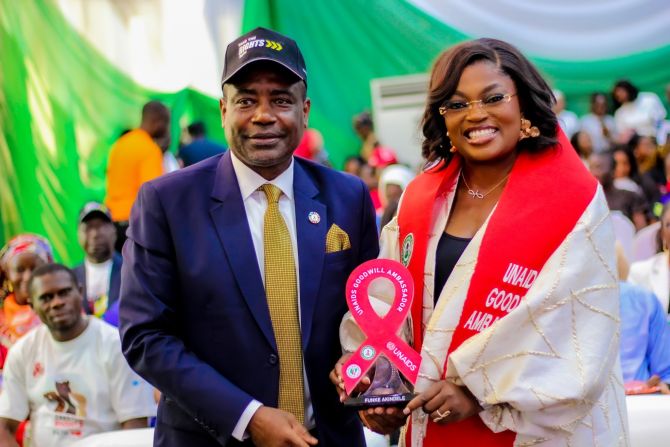
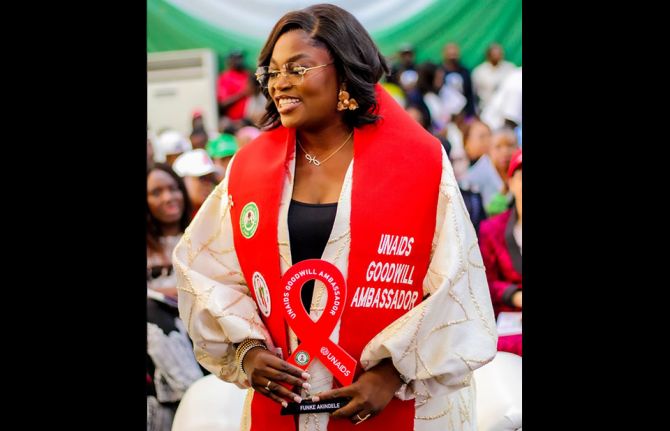
Press Release
UNAIDS appoints artist Funke Akindele as National Goodwill Ambassador for Nigeria
03 December 2024 03 December 2024ABUJA, NIGERIA, 3 December 2024 — The Joint United Nations Programme on HIV/AIDS (UNAIDS) is pleased to announce the appointment of Funke Akindele, a multiple award-winning actress, movie producer and director, as its new National Goodwill Ambassador (GWA) for Nigeria. This prestigious nomination recognizes Funke Akindele’s outstanding contributions to the fight against HIV and her unwavering commitment to advocacy, raising awareness, and driving efforts to end AIDS as a public health threat by 2030.
Funke Akindele’s career took off with her role in the United Nations Population Fund (UNFPA)-sponsored television series “I Need to Know”, which focused on adolescent reproductive health and rights, including HIV. Since then, she has captivated audiences worldwide, earning millions of fans and accolades for her unforgettable roles. Known as the “Queen of Box Office” in Nollywood, Funke holds the top three slots on the list of highest-grossing Nollywood films of all time, reflecting her prominence and influence in the industry.
Over the past two decades, Funke Akindele has consistently broken barriers and used her platform to amplify social impact issues, influence positive change, and champion causes that matter. As UNAIDS’ National Goodwill Ambassador, she will contribute to efforts aimed at eliminating vertical transmission of HIV, ending HIV-related stigma and discrimination, and promoting HIV prevention across Nigeria.
Nigeria has made significant strides in the fight against HIV over the past two decades. As of 2023, approximately 2 million people are living with HIV in the country, with an adult prevalence rate of 1.3% among individuals aged 15–49. Nigeria recorded approximately 130,000 new HIV infections in 2010. By 2023, this number had declined to about 75,000 new infections, representing a reduction of approximately 55,000 cases, or a 42.3% decrease over the 13-year period. . The country has also achieved notable progress in treatment access, with 1.6 million out of the 2 million people living with HIV in Nigeria currently on treatment.
Despite these advancements, challenges remain, including addressing stigma and discrimination, and ensuring equitable access to prevention and treatment services across all regions.
“We are thrilled to welcome Funke Akindele as our National Goodwill Ambassador for Nigeria,” said Dr Leopold Zekeng, UNAIDS Country Director for Nigeria. “Her powerful voice, vast influence, and commitment to social change make her an invaluable ally in our efforts to combat HIV and support people living with HIV in Nigeria. We look forward to working with her to drive positive impact and progress in the fight against AIDS.”
The nomination process for the National Goodwill Ambassador involved active collaboration with the National Agency for the Control of AIDS (NACA), which has expressed appreciation for UNAIDS’ role in securing such a significant partnership for Nigeria’s HIV response. Funke Akindele’s work as a National Goodwill Ambassador will be vital in mobilizing efforts for HIV prevention and ensuring that key messages reach wider audiences across the country.
The official announcement of Funke Akindele’s appointment as UNAIDS National Goodwill Ambassador was made during the World AIDS Day commemoration in Abuja on 3 December 2024, during an event led by the United Nations Resident Coordinator for Nigeria, Mr. Mohammed M. Malick Fall.
Region/country

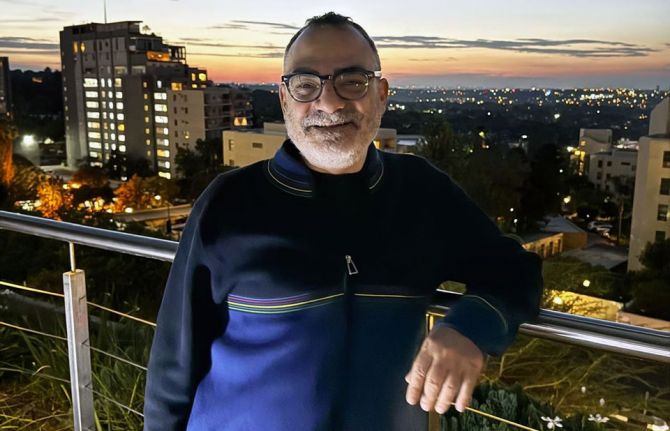
Feature Story
Christoforos Mallouris: From personal struggle to collective strength
29 November 2024
29 November 2024 29 November 2024Christoforos Mallouris' journey from humble beginnings in Cyprus to becoming a prominent global HIV advocate is a powerful story of personal transformation.
In his youth, Mallouris struggled with accepting his sexuality. "I couldn’t admit to myself that I was gay," shares Mallouris. The burden of self-stigma made it difficult for him to value his life: "In a way, I was homophobic towards myself and others."
At 29, while studying in Chicago, he was diagnosed with HIV. The diagnosis marked a pivotal moment in his life. "It changed how I understood myself, really forcing me to learn to value my life and accept who I am."
By the time he was diagnosed, he had already developed AIDS. Fortunately, Mallouris got support from his sister, who came to take care of him during his lowest moments.
Being HIV-positive in the United States as a foreign student presented its own set of challenges. "At the time, being HIV positive in the United States as a foreigner was illegal," Mallouris recalled, "so if the authorities found out, I would be deported." The fear of deportation hung over him as he was doing his PhD in astrophysics, but that fear also catalyzed his first act of activism.
Faced with health insurance that covered only two months of his costly HIV medication, Mallouris approached the Dean of Students at the University of Chicago. He boldly stated, "What are you going to do about it? I’m sure you don’t want this to go to the press." To his surprise, the Dean took immediate action, negotiating better health insurance coverage for all students with chronic illnesses.
As Mallouris’ health improved, he began to question his career path. Although he had completed his PhD in astrophysics, he no longer felt fulfilled enough by that field. He sought something that connected directly to being able to help people.
After securing a postdoctoral position at the Institute of Astrophysics in Paris, Mallouris found himself increasingly drawn to HIV work, so he started volunteering at a local NGO focused on HIV education and prevention for non-French speakers in Paris. It wasn’t long before he realized that this work was where his heart was.
He joined the Global Network of People Living with HIV, managing community empowerment programs in the HIV response. "I changed my career because of my HIV status," he said. "I wanted to do something that truly impacts lives."
Mallouris has had to overcome stigma and discrimination throughout his journey. Dating, for instance, was difficult. "There was a lot of rejection as soon as people found out I was HIV-positive," he shared. But despite the challenges, he found strength in the support of his friends, who have stood by him unconditionally. "I am lucky to have a strong network of support."
Mallouris joined UNAIDS in 2013, first as a Community Mobilization Advisor in Geneva and later as an Equality and Rights Advisor in Johannesburg. He describes UNAIDS as a supportive and inclusive workplace, where he feels valued for his skills and experience.
Mallouris highlights that the work to help secure treatment for people living with HIV is inseparable from the work to secure the recognition of people living with HIV as equal human beings. "Success in the HIV response depends on accepting all people, especially the most marginalized members of society.”
Mallouris is proud as he looks back, and hopeful as he looks ahead. He will always speak out for the rights of communities, even when—especially when—it isn’t popular.
HIV may have started as a burden in his life, but over time, it has become his strength, guiding him towards work that makes a profound difference, advancing a world where everyone is safe, has a place, and is welcome.



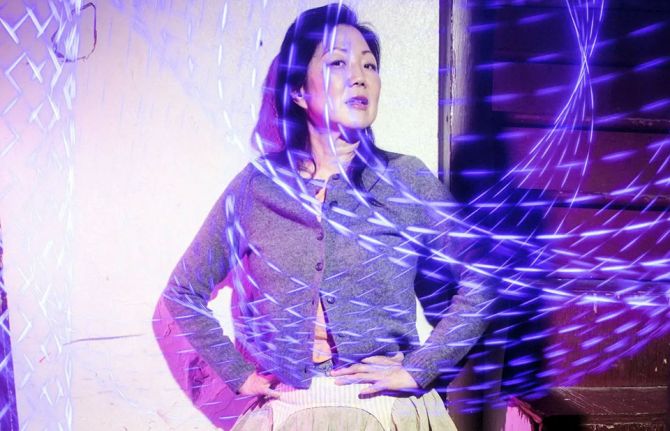
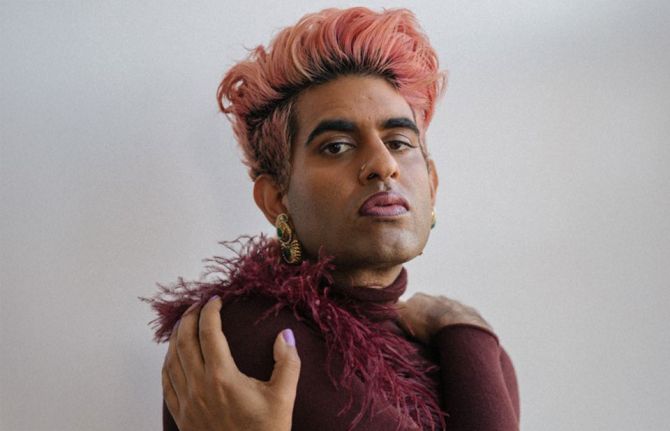

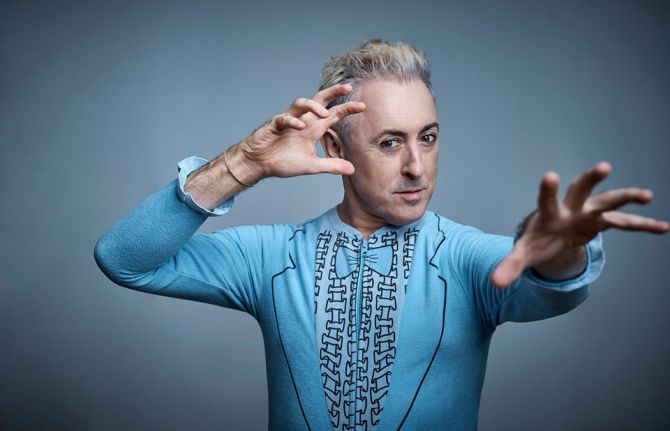
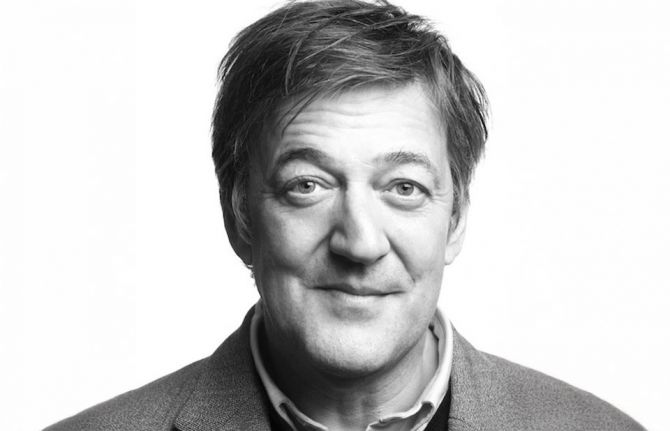




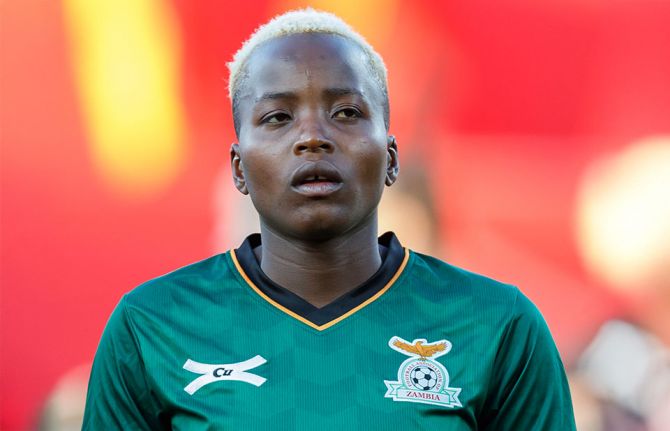
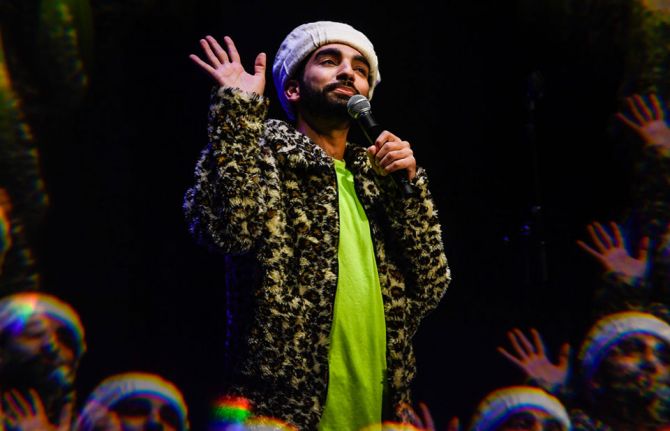

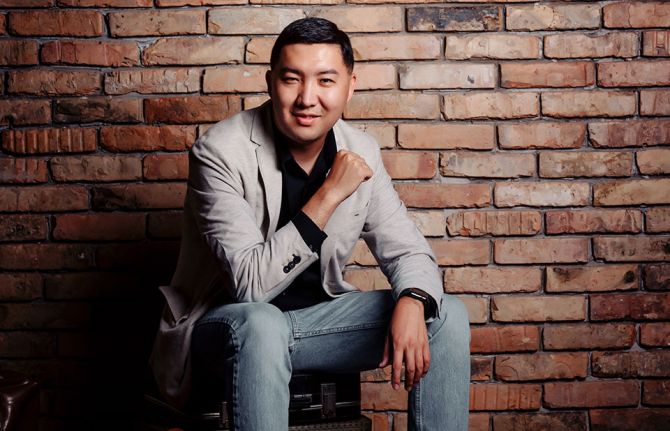
Press Release
Global celebrities unite behind UNAIDS’ call for world leaders to “take the rights path to end AIDS”
01 December 2024 01 December 2024GENEVA, 1 December 2024 — This World AIDS Day (1 December), sixteen global celebrities, including Hollywood film star Luke Evans and singer-songwriter Sia of the Unstoppable hit song, are uniting behind UNAIDS’ call for world leaders to protect human rights, which they say is vital to ensuring the success of efforts to end AIDS.
The celebrities, including actress and comedian Margaret Cho; comedian and poet Alok Vaid-Menon; fashion designer and television personality Tan France; actor Alan Cumming; actor, broadcaster and comedian Stephen Fry; actress Uzo Aduba; Moroccan artist OUM; South African actress Thuso Mbedu; Chinese actor and singer Huang Xiaoming; professional football player Racheal Kundananji; Pakistani-British actor and comedian Mawaan Rizwan; Filipino model and actress Pia Wurtzbach; Ukrainian singer and TV show host Vera Brezhneva; and popular television presenter Erkin Ryzkullbekov have come together in support of UNAIDS call to “Take the rights path to end AIDS.”
“The choice is clear if we want to end AIDS as a public health threat. World leaders must take the rights path to protect people’s right to health and life. When human rights are respected and guaranteed, their lives are greatly improved because they can freely seek healthcare, including HIV prevention and treatment.” said Stephen Fry, broadcaster and comedian.
“In far too many countries, people are still criminalized for being who they are or for who they love. When LGBTQ+ people are criminalized, they are driven underground and out of reach of health services, including services to prevent and treat HIV.” said Alok Vaid-Menon, American comedian and poet.
The report highlights gaps in the realization of human rights and shows how violations of human rights are obstructing the end of the AIDS pandemic.
63 countries still criminalize LGBTQ+ people.
Discrimination against girls and women, from denial of education to denial of protection from gender-based violence, is also undermining progress in the global HIV response. In 2023, women and girls accounted for 62% of new HIV infections in sub-Saharan Africa.
“We all win the fight against AIDS when human rights and the right to health are secured for everyone everywhere. We can end AIDS as a public health threat by promoting rights, respect and dignity for all." said, Margaret Cho, actress and comedian.
“When girls cannot get access to education and information, when young women cannot access HIV prevention and testing, they are put at much greater risk of acquiring HIV,” said Winnie Byanyima, Executive Director of UNAIDS.
In 2023 alone, 1.3 million people around the world were newly infected with HIV—three times higher than the global target set for 2025 of no more than 370 000 new infections.
“To protect everyone’s health, we need to protect everyone’s rights,”
UNAIDS World AIDS Day report, “Take the rights path to end AIDS”, shows that the world can end AIDS—if the human rights of people living with or affected by HIV are respected, protected and fulfilled, to ensure equitable, accessible and high-quality HIV services.
UNAIDS
The Joint United Nations Programme on HIV/AIDS (UNAIDS) leads and inspires the world to achieve its shared vision of zero new HIV infections, zero discrimination and zero AIDS-related deaths. UNAIDS unites the efforts of 11 UN organizations—UNHCR, UNICEF, WFP, UNDP, UNFPA, UNODC, UN Women, ILO, UNESCO, WHO and the World Bank—and works closely with global and national partners towards ending the AIDS epidemic by 2030 as part of the Sustainable Development Goals. Learn more at unaids.org and connect with us on Facebook, Twitter, Instagram and YouTube.
World AIDS Day report 2024

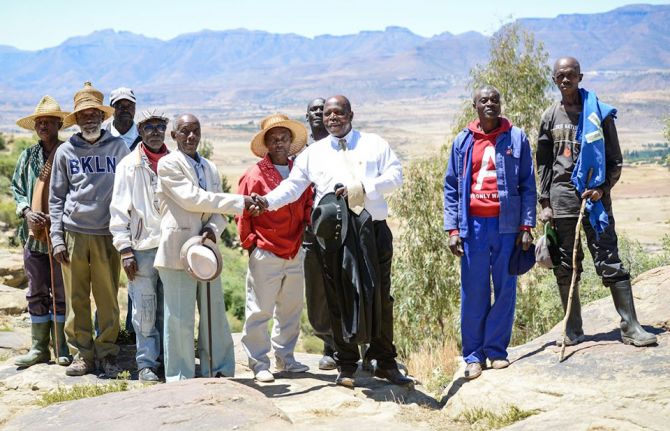
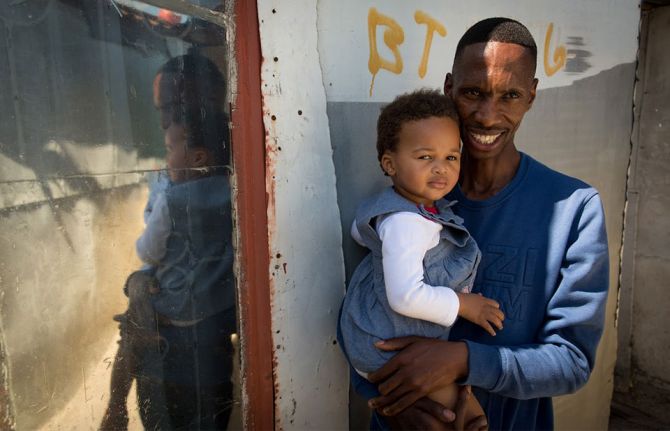
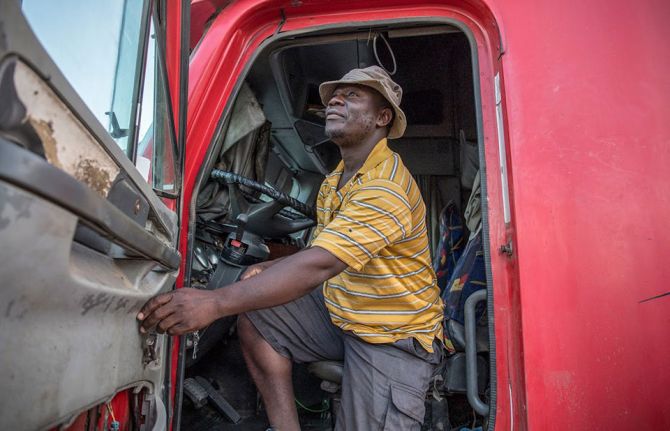
Feature Story
To end AIDS, communities mobilize to engage men and boys
04 December 2024
04 December 2024 04 December 2024Michael Onyango rises before dawn in his Nairobi apartment and catches a train eight hours east to Kilifi, a coastal town north of Mombasa. Resorts populate Kilifi’s sandy beaches and narrow wooden boats dot the water. Onyango heads inland to meet with the Kilifi County health management team, before dashing to an assembly of peer outreach workers from across the districts of Kaloleni, Malindi and Kilifi North.
Onyango runs the Movement of Men Against HIV in Kenya (MMAHK), spearheading a community-led monitoring initiative in the region to address the high numbers of men and boys who lack access to HIV services. In Kenya, only 65 percent of the men and boys over 15 years of age who are living with HIV are on antiretroviral therapy, compared to 80 percent of women and girls. The trend is mirrored globally: in 2024, the WHO and UNAIDS released data that men lagged on progress in achieving the 95-95-95 targets. Worldwide just 83 percent of men living with HIV know their status; 72 percent are on treatment and only 67 percent are virally suppressed.
MMAHK, in collaboration with the Masculinity Institute (MAIN), the International Network of Religious Leaders (INERELA+Kenya) and the UNAIDS Kenya country office, came together to tackle these service gaps in Kilifi County, which surrounds the town of the same name. The area, home to around 1.5 million residents, extends westward from the Indian Ocean and supports livelihoods through fisheries, factories, cashew nut mills, and farming.
In Kilifi, peer data collectors have identified that health facilities need to change their opening days and hours to accommodate the work and school day.
Community organizers are also working to challenge harmful prejudices that assert that men visiting a health facility or seeking an HIV test are “weak”.
As they rapidly roll-out peer support groups to challenge these beliefs, Onyango has had flashbacks to the pandemic’s earlier phases, when in the 1990s he worked as a counselor in a Nairobi hospital. HIV treatment was not yet available. “Many men I met who found out they were positive would resign from their jobs, go to their rural homes, sell their property, and wait to die,” Onyango said.
In 2001, Onyango and others started MMAHK to create a safe space for men to talk about their health needs. MMAHK also ran community testing, workplace outreach and targeted advocacy with religious and cultural leaders. As grassroots initiatives challenged harmful gender norms, Onyango saw social stigma and self-stigma among men decrease across Kenya. But the past few years have seen a resurgence of harmful norms around masculinity.
Onyango shares that the shift in funding away from many community initiatives, which were seen as harder to measure than biomedical interventions, has hampered community engagement efforts. Both are needed, he says. For example, although HIV treatment and voluntary male circumcision are now available in Kenya, cultural factors prevent some men from accessing these services.
A regional strategy developed in 2022 by UNAIDS, WHO, UN Women and partners –“Male Engagement in HIV Testing, Treatment and Prevention in East and Southern Africa” – outlines four key approaches: Improve access to health for men and boys and decrease vulnerability; prevent HIV among men and boys; diagnose more men and boys living with HIV; and increase the proportion of men and boys accessing and adhering to antiretroviral therapy.
“Tackling harmful masculinity also has a ripple effect,” reflects Lycias Zembe, a UNAIDS advisor in Geneva. “Harmful gender norms affect everyone, and changing these norms creates a better environment for women and girls and for men and boys.”
Community initiatives like MMAHK remain key. To challenge gender norms, MMAHK positions service access as courageous, and educates men that discussing emotions is a sign of strength. At 63, Onyango shows no signs of slowing down: “We’re going to keep addressing self-stigma and figure out how to help men access the services that they need to stay healthy,” he said. “We don’t have any other option.”
Region/country


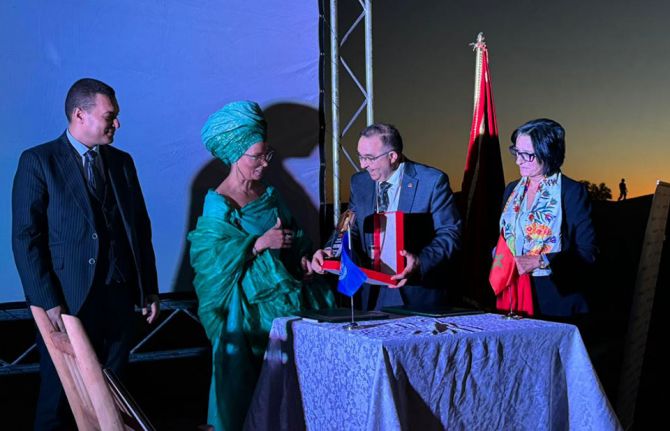
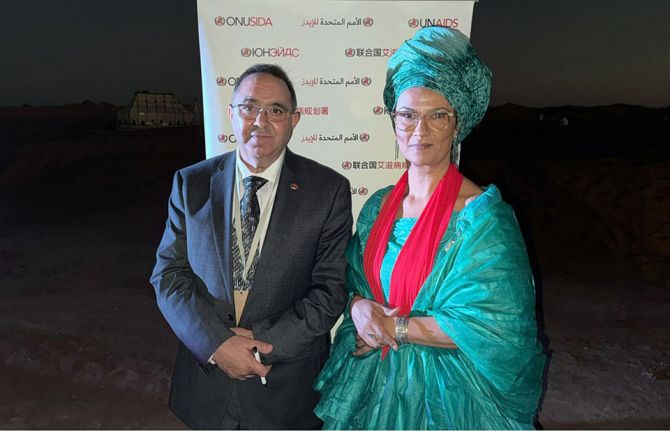
Press Release
UNAIDS appoints the artist OUM as National Goodwill Ambassador in Morocco
02 November 2024 02 November 2024MHAMID AL GHIZLANE, 2 November 2024 — The Joint United Nations Programme on HIV/AIDS (UNAIDS) is pleased to announce the appointment of renowned Moroccan artist OUM as its National Goodwill Ambassador in Morocco. The prestigious announcement was made at the Taragalte Festival, held from November 1-3, 2024, in Mhamid El Ghizlane, where OUM proudly serves as the festival's ‘Godmother.’ OUM’s influence and commitment to social change will play a vital role in UNAIDS' efforts to combat HIV/AIDS in Morocco and beyond.
“OUM’s appointment as National Goodwill Ambassador is a powerful step forward in our efforts to fight against HIV in Morocco,” said Houssine El Rhilani, UNAIDS Country Director for Morocco. “Her artistic influence and commitment to social causes will help amplify our messages of prevention, tolerance, and support for people living with HIV.”
In her new role, OUM will work to promote awareness and education around HIV prevention. She will also focus on fighting against the stigma and discrimination faced by people living with HIV. “As an artist, I have a platform to reach many people. It is my duty to use my voice to advocate for people living with and affected by HIV who are often unheard,” said OUM. “I am honored to take on this role with UNAIDS and am committed to supporting the fight against HIV in Morocco.”
Morocco faces significant challenges in the fight against HIV, with approximately 23,000 people currently living with the virus. The National Integrated Strategic Plan for HIV, Viral Hepatitis, and STIs (2024-2030) outlines essential actions to strengthen HIV prevention efforts and improve access to care, particularly for populations most affected by HIV. OUM's role as an ambassador is vital in driving these efforts forward.
OUM is no stranger to social advocacy, having previously collaborated with various United Nations agencies. Her engagement includes speaking on international platforms and participating in initiatives promoting women's rights and education. The official ceremony for OUM’s appointment highlighted her commitment to raising awareness around HIV issues in Morocco. It featured speeches from local leaders, including representatives from the region of Zagora and the Ministry of Health and Social Protection. The festival itself serves as a cultural backdrop, emphasizing the power of music and art in promoting peace and social change.
As UNAIDS continues its mission to end AIDS as a public health threat by 2030, collaboration with influential figures like OUM is crucial. Her role as National Goodwill Ambassador will not only increase awareness but also inspire collective action to ensure that all people affected by HIV, regardless of their status, have access to the care and support they need.
UNAIDS
The Joint United Nations Programme on HIV/AIDS (UNAIDS) leads and inspires the world to achieve its shared vision of zero new HIV infections, zero discrimination and zero AIDS-related deaths. UNAIDS unites the efforts of 11 UN organizations—UNHCR, UNICEF, WFP, UNDP, UNFPA, UNODC, UN Women, ILO, UNESCO, WHO and the World Bank—and works closely with global and national partners towards ending the AIDS epidemic by 2030 as part of the Sustainable Development Goals. Learn more at unaids.org and connect with us on Facebook, Twitter, Instagram and YouTube.




